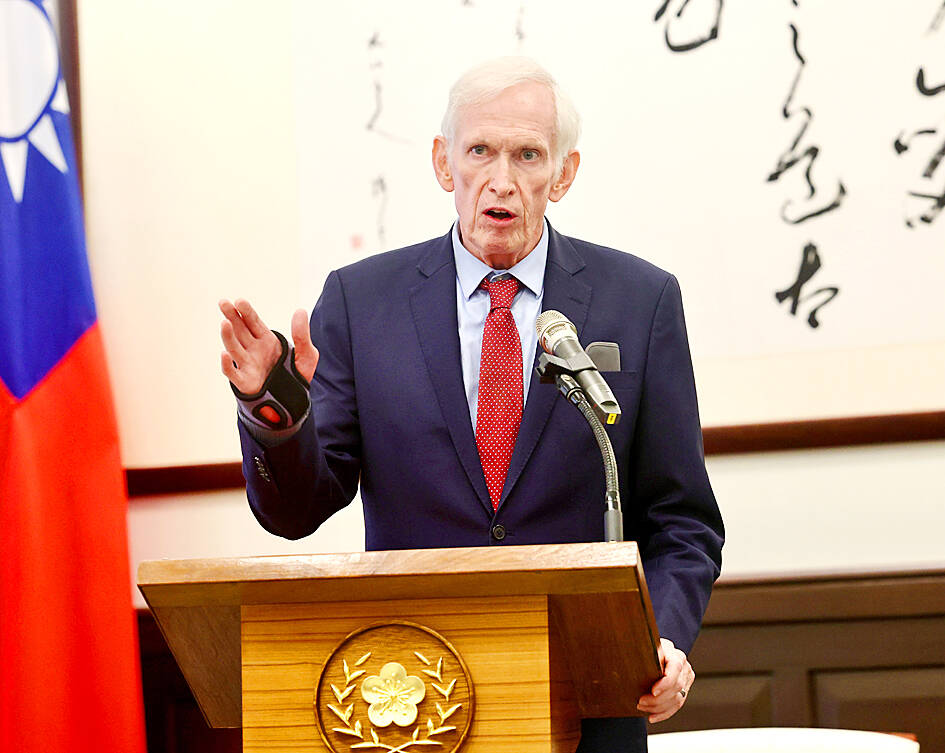President William Lai (賴清德) yesterday emphasized Taiwan’s determination to defend itself and cooperate with other democracies to handle global challenges, in a meeting with former American Institute in Taiwan (AIT) chairman James Moriarty.
The nation is to continue strengthening its defensive capabilities and show its resolve to defend itself and democracy, he was cited as saying by the Presidential Office in a statement.
Taiwan would also maintain its cooperation with the US and other like-minded nations in dealing with global challenges posed by pandemics and climate change, he said.

Photo: CNA
Lai thanked Moriarty for his support of the nation and contributions to its ties with the US, adding that he hoped the bilateral relationship would be strengthened to defend peace and stability in the Taiwan Strait.
The president welcomed Moriarty’s visit to Taiwan and said that the two have met multiple occasions during his tenures as Tainan mayor, premier and vice president.
Moriarty is counted as a personal friend and a good friend of Taiwan, who expanded the scope of bilateral relations and deepened their development, Lai said.
After departing from the AIT, Morarity continued his contributions to Taiwan by urging Washington to strengthen military cooperation between the two nations, he said.
Lai also thanked the US Congress for implementing the Taiwan Relations Act, the “six assurances” and other promises to Taiwan, which bolstered its defenses against authoritarian expansionism.
Moriarty said his personal feelings for Taiwan and commitment to keeping promises reflect the shared views of the US public.
Taiwan-US relations are based not only on common interests, but also on the two nations’ common values and principles, he said.
Peace and stability are the most important of Taipei and Washington’s mutual interests, Moriarty said, adding that the two must insulate their economies and societies from foreign interference.
Taiwan and the US face numerous internal and external challenges, but Moriarty said he was confident that cooperation and solidarity would continue to strengthen the alliance of democracies.
Moriarty thanked Lai and Taiwanese for his reception, their friendship with the US, and their support of democracy and other common values.
Separately, Minister of National Defense Wellington Koo (顧立雄) said the long-standing and constant view of the government is that war is best prevented by credible deterrence through strength.
He made the comments on the sidelines of a question-and-answer session at the legislature in Taipei, saying that Taiwan would continue working toward being part of the US Indo-Pacific strategy of systematic deterrence against Beijing’s adventurism.
The goal is to improve defensive capabilities to compel Chinese President Xi Jinping (習近平) to continually push back the timeline for taking over Taiwan, Koo said.
The US has done much to buttress security cooperation with allies including Japan and the Philippines, he said, adding that Taiwan’s strategically valuable location on the first island chain yields no alternative but to join the US-led security alliance.
Additional reporting by Lin Che-yuan

DAREDEVIL: Honnold said it had always been a dream of his to climb Taipei 101, while a Netflix producer said the skyscraper was ‘a real icon of this country’ US climber Alex Honnold yesterday took on Taiwan’s tallest building, becoming the first person to scale Taipei 101 without a rope, harness or safety net. Hundreds of spectators gathered at the base of the 101-story skyscraper to watch Honnold, 40, embark on his daredevil feat, which was also broadcast live on Netflix. Dressed in a red T-shirt and yellow custom-made climbing shoes, Honnold swiftly moved up the southeast face of the glass and steel building. At one point, he stepped onto a platform midway up to wave down at fans and onlookers who were taking photos. People watching from inside

A Vietnamese migrant worker yesterday won NT$12 million (US$379,627) on a Lunar New Year scratch card in Kaohsiung as part of Taiwan Lottery Co’s (台灣彩券) “NT$12 Million Grand Fortune” (1200萬大吉利) game. The man was the first top-prize winner of the new game launched on Jan. 6 to mark the Lunar New Year. Three Vietnamese migrant workers visited a Taiwan Lottery shop on Xinyue Street in Kaohsiung’s Gangshan District (崗山), a store representative said. The player bought multiple tickets and, after winning nothing, held the final lottery ticket in one hand and rubbed the store’s statue of the Maitreya Buddha’s belly with the other,

‘NATO-PLUS’: ‘Our strategic partners in the Indo-Pacific are facing increasing aggression by the Chinese Communist Party,’ US Representative Rob Wittman said The US House of Representatives on Monday released its version of the Consolidated Appropriations Act, which includes US$1.15 billion to support security cooperation with Taiwan. The omnibus act, covering US$1.2 trillion of spending, allocates US$1 billion for the Taiwan Security Cooperation Initiative, as well as US$150 million for the replacement of defense articles and reimbursement of defense services provided to Taiwan. The fund allocations were based on the US National Defense Authorization Act for fiscal 2026 that was passed by the US Congress last month and authorized up to US$1 billion to the US Defense Security Cooperation Agency in support of the

‘COMMITTED TO DETERRENCE’: Washington would stand by its allies, but it can only help as much as countries help themselves, Raymond Greene said The US is committed to deterrence in the first island chain, but it should not bear the burden alone, as “freedom is not free,” American Institute in Taiwan Director Raymond Greene said in a speech at the Institute for National Defense and Security Research’s “Strengthening Resilience: Defense as the Engine of Development” seminar in Taipei yesterday. In the speech, titled “Investing Together and a Secure and Prosperous Future,” Greene highlighted the contributions of US President Donald Trump’s administration to Taiwan’s defense efforts, including the establishment of supply chains for drones and autonomous systems, offers of security assistance and the expansion of